Seven Leadership Lessons from The Medtech Conference 2022
- Scott Whitaker President & Chief Executive Officer
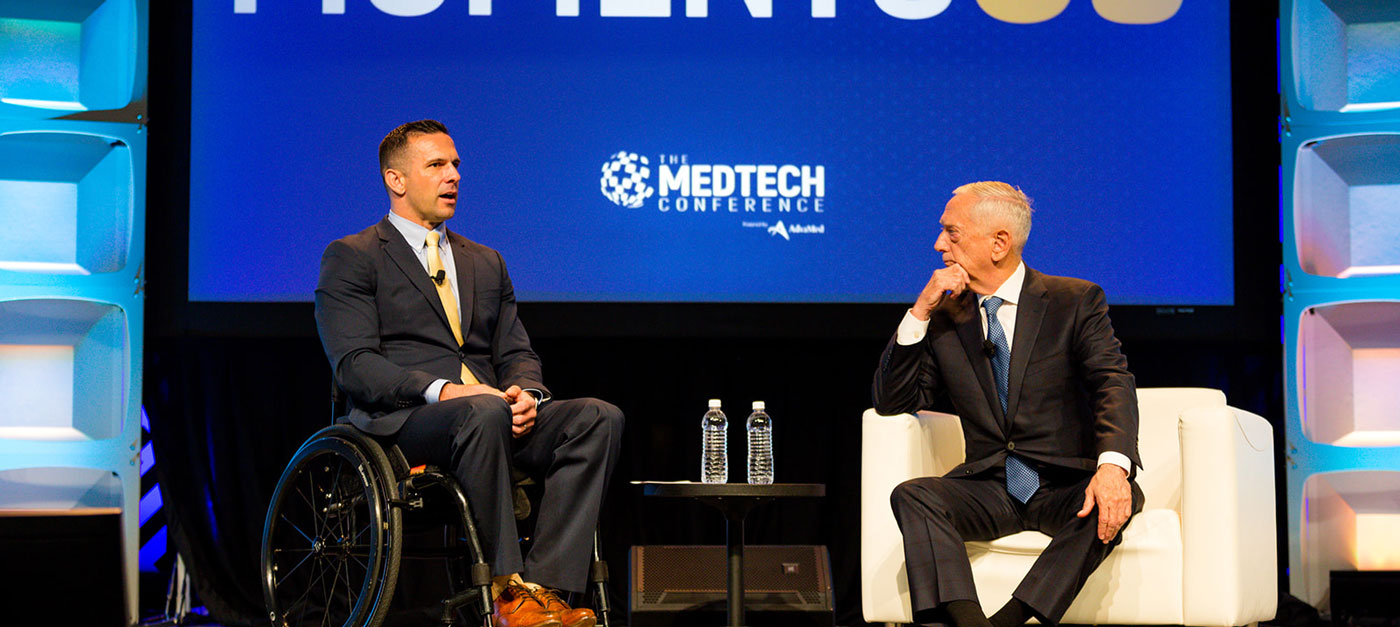
Retired four-star General James Mattis discusses leadership with Derek Herrera, CEO of Bright Uro, at AdvaMed®’s 2022 The Medtech Conference in Boston.
The Medtech Conference 2022 featured plenary speakers and panelists who shared enough wisdom to fill books. In fact, some of them have written books. Whether in medtech or beyond, they were informative and inspiring. A few highlights:
Treat your employees well, create a positive culture, and they’ll do their best work.
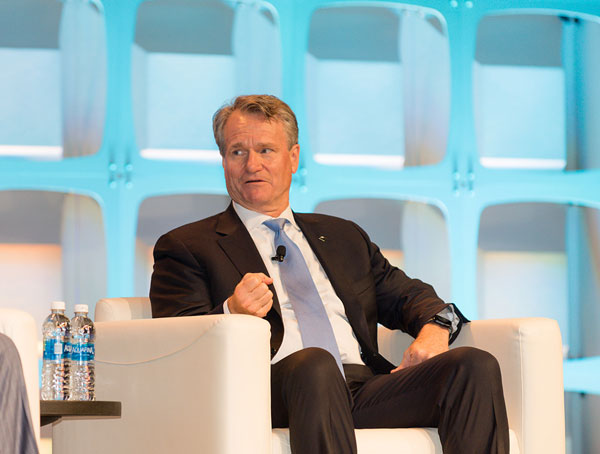
Emphasizing wellness, including mental health, holding down employee health care costs, and setting a minimum starting wage around the cost of raising a family, are tactics Bank of America uses to help employees have a good quality of life and do a good job for customers, said Brian Moynihan, chair of the board and chief executive officer. These assets also help companies attract and retain employees in a tight labor market, he said.
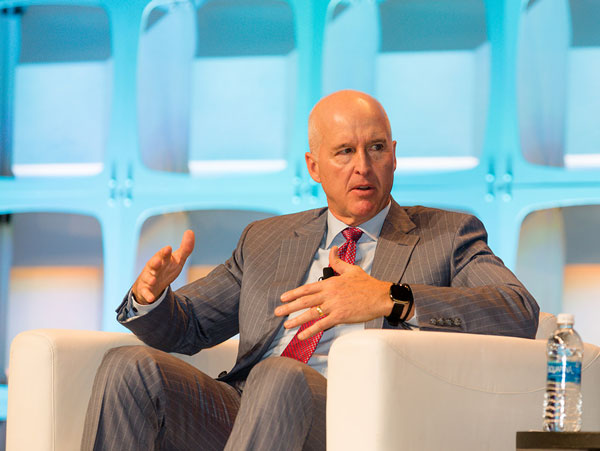
Mike Minogue, Abiomed chairman, president, and chief executive officer, said the company’s “patients first” philosophy reinforces the sense of purpose that draws a talented workforce. Bobby Goines, a 31-year-old married father of three, met the creators of his life-saving heart pump at company headquarters. “There’s not a dry eye in the place [during the visit],” Minogue said. “We don’t make toaster ovens. We are doing something that has great purpose, and we celebrate it all the time.”
Also, Abiomed has created a campus at headquarters, with walking trails and activities such as food trucks. When executives come to town, Minogue has them stay with fellow executives rather than at a hotel. “It changes the dynamics. They have breakfast together. That’s something you want to do.”

Ashley McEvoy, executive vice president, worldwide chairman, Johnson & Johnson Medtech, recognized how hard employees worked during the pandemic, the majority in their usual laboratories, manufacturing, and care settings, not at home. She said employees need to recharge so they can continue to give their best service to patients.
Seek out and listen to points of view from non-obvious sources.
Retired four-star General James Mattis sought out mavericks in his distinguished military career. He advised overcoming superficial biases. The Marine needing a haircut might have the best idea for targeting a terrorist cell. Similarly, “Not all the good ideas come from the nation with the most aircraft carriers,” Mattis said.
Consider the entire customer experience from every angle. Design your products accordingly.
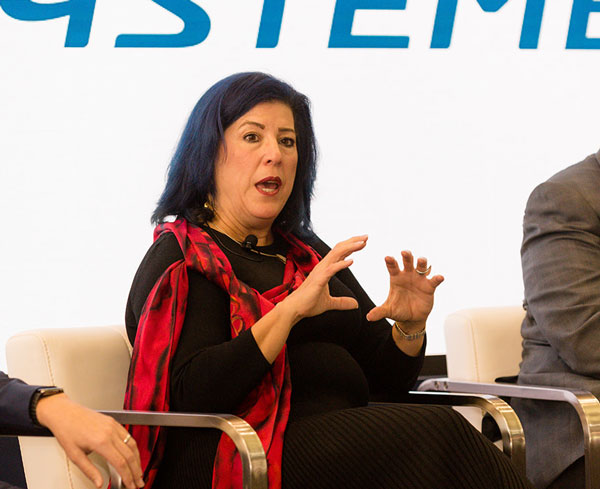
Antoinette Gawin, president and chief executive officer of Terumo Blood and Cell Technologies, suggested designing for the outliers, not the average experience. Innovators need to take themselves out of the office and think about the limited mobility patient and inexperienced nurse who might be struggling with a needle stick device. Achieving impact requires combining qualitative and quantitative analysis with common sense and putting yourself in others’ shoes, she said. For one patient, finding a ride to surgery might have been the most stressful part.
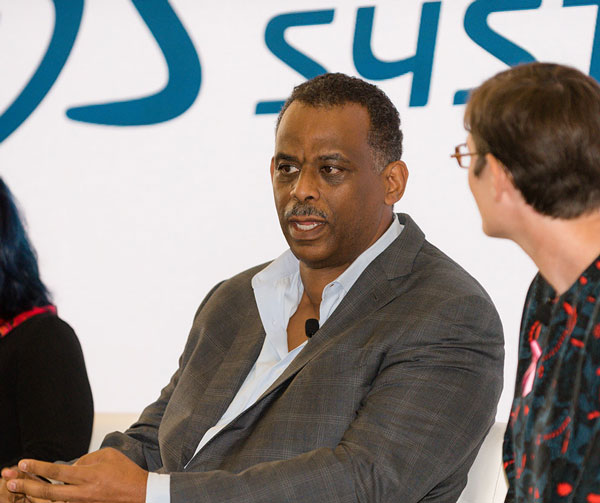
Lishan Aklog, MD, chairman and chief executive officer of PAVmed, agreed. He said innovation requires taking into account all aspects of the patient experience: the level of invasiveness, the level of pain, the economics of it, the access. The technology is incredible but only part of what makes for a positive patient experience.
Delegate widely after coaching extensively.
Opportunities open and close quickly. “You want to delegate to the lowest capable level,” Mattis said. But you must mature into coaching capably, then spend a lot of time doing it. A leader sets the goal – as in, we need our troops on the banks of the Euphrates River – and leaves two-thirds of how to reach the goal open for a capable staff to fill in. Related, a successful leader relies on synergistic talent, said Lester Knight, founding partner and senior adviser of RoundTable Healthcare Partners, describing the complementary skills of his long-time colleague Joe Damico: “You have to know what you don’t know.”

Use mistakes as learning experiences.
Leaders set the stage with integrity and boundaries for non-negotiable behavior, such as moral turpitude, Mattis said. Beyond that, “You need to know the difference between a mistake and a lack of discipline.” If people make honest mistakes and learn from them, hang onto those employees. If you fire people over basic mistakes, you’ll have only “scaredy cats who won’t take any initiative.”
“A crisis in itself is a race between time and knowledge.”
––General James Mattis
Learn from every crisis, including how to get through the next crisis.

Derek Herrera, CEO of Bright Uro and a Marine wounded in battle, and Mattis agreed military service is a study in navigating difficult environments. Mattis said you learn what you can and cannot control: “A crisis in itself is a race between time and knowledge.” Surviving a crisis requires competence, confidence, and the application of empathy. The latter isn’t a “wishy, washy soft thing” – it’s understanding what your people are experiencing. “You’ve got to absorb the fear and understand the fear but exude hope.”
The COVID-19 pandemic yielded numerous innovations out of necessity that may be here to stay. The “burst of creativity and activity” in expanding telemedicine and digital health proved patients like Aklog’s 86-year-old mother don’t need to go to every appointment in person, he said.
Dr. Robert Califf, FDA commissioner, said remote work during the pandemic helped the agency realize its best medical device reviewers might not be in Washington, D.C., and to embrace flexibility.
Enjoy the purpose of your work and your colleagues’ company.

Minogue described Abiomed’s new program to reach cardiac patients in under-served communities, based on a study showing positive outcomes for non-Caucasian patients using the company’s Impella heart pump. The initiative requires navigating complex insurance programs such as Medicaid, challenging but necessary to reach these patients. “We have to do that collectively, as a company but as an industry, so that more companies can do these programs,” Minogue said.
McEvoy said the medtech industry is equipped to continue making strides in easing health disparities. Data make it possible to examine the barriers and what interventions to take, whether that’s “how people don’t have access to a six-minute [cataract surgery] procedure that can restore sight for life” or why maternal health lags in some states. “When your personal values are aligned with your professional values, you’re absolutely unstoppable.”
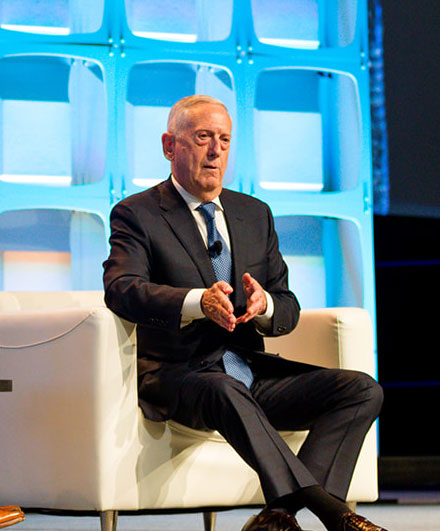
Mattis said Herrera, using a wheelchair as a wounded veteran, exemplifies how “we all choose our own responses” to adversity. Herrera has chosen to “put others first” in helping fellow patients through a medtech company and veterans through MedtechVets, an organization Minogue, a former U.S. Army officer, founded. Mattis said serving with Marines like Herrera is “why I stayed in that low-paying outfit for 40 years. I was humbled every day by it.”
I hope you enjoyed these insights as much as I did. Be sure to join next year’s The Medtech Conference in Anaheim, California, October 9-11, where we’ll have another full slate of brilliant speakers.
Hear Patient Stories
The Story of Medtech empowers patients to share their experiences with medical technology in an effort to educate, inspire, and create community.